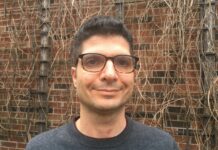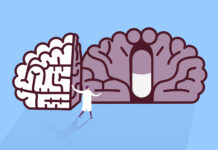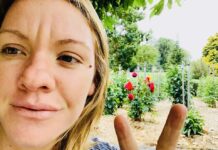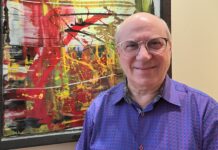Johann Hari: Stolen Focus – Why You Can’t Pay Attention
Johann Hari joins us to talk about his latest book Stolen Focus: Why You Can’t Pay Attention, in which he examines the reasons behind our inability to focus and seeks to understand how this crisis affects our wellbeing and society.
Home Alone: Finding Connection During the Pandemic
This wave of emotional distress is a perfectly reasonable human response to living our lives in an increasingly isolated and uncertain world.
August 20, 1985: The Day My Psychotic Episodes Ended
I didn’t know that I had never fully experienced my emotional pain until I was thrown into an altered state. With “psychosis” I plowed through layers and layers of pain, alone in the night.
Grief: A Shamanic Perspective
From a shamanic perspective, the biggest mechanism for soul retrieval is not anything mystical at all. It is something with which any adult is familiar. It is grief.
Understanding the Youth Mental Health Crisis: An Interview with Elia Abi-Jaoude
The child psychiatrist talks about the importance of seeing the big picture and why parents shouldn't "be afraid if their kid is in distress."
New NICE Guidelines for ECT Are Dangerously Inadequate, Say 50 Patients and Professionals
An open letter from patients, psychiatrists, and professors calls on NICE to rewrite the new ECT guidelines to avoid putting patients’ safety at risk.
Fireside Project: Peer Support for Psychedelic Experiences
A new nonprofit support line takes a harm-reduction approach and helps people process their psychedelic experiences.
When It Comes to Mental Health Problems, The Disability Framework Fails: A Response to...
A response to the thought-provoking comments and concerns on the previous blog, furthering the discussion about disability and mental disorder.
“Mental Health” Is a Euphemism for Policing Social Deviance
"Mental health" discourse conceals the fact that mental illness is still treated as a social deviance by the authoritarian institution of psychiatry.
Critical Psychology for a Better Society: An Interview with Sebastienne Grant
Micah Ingle interviews Sebastienne Grant about her work developing a critical psychology program to reimagine and restructure social systems.
The Other Side of the Cage
My doctor estimates that I have less than a year to live. I do not want my life to end as it began, with trauma, pain and dehumanization. I would like dignity and compassion in my final days.
Guardianship Destroyed My Family
People who can’t take care of themselves need support and protection, but guardianship provides neither. I know: I've lived it.
SSRI Antidepressants Do Not Improve Depression After a Stroke
A study in JAMA Neurology finds that antidepressants do not reduce depression symptoms more than placebo in patients recovering from a stroke.
Can Anything Good Come Out of Therapy?
I used to think therapy could be beneficial if only you went through the trials of finding a good therapist. What I didn’t ever question was the process itself or if I really needed to do it at all.
Interview: Abuse and Neglect at Private “Troubled Teen” Centers
Parents, beware: Disability rights lawyer Diane Smith Howard shares disturbing findings on conditions at youth residential treatment facilities.
Addressing the Social Determinants of Mental Health—or Perhaps Not
An article by the APA president merely pays lip service to the psychosocial causes of mental health problems.
Inside a Forensic Psychiatry Unit: The Ground Where Death Meets Life
How the unrelated murder of an inmate on another unit led to Sean's transfer, his escape from forced medication, and eventually, his release.
The Year Of Potentiality
I lost three years of my life to my first psychosis. I am living proof that your entire world can be smashed into a trillion pieces and you can recover and turn the broken pieces of glass into a kaleidoscope.
Consumer Regret
Eventually I realized the drugs were safe and effective—for those prescribing them. Shrinks can never be sued for malpractice since it's "standard care" even if they kill you.
New Review: Antidepressants Come with Minimal Benefits, Several Risks
A review of research on antidepressant efficacy finds that an unfavorable risk-to-benefit ratio.
When Tapering Antidepressants, is Going Slow Always the Best Strategy?
Do we take enough account of total drug exposure time when devising antidepressant tapering strategies?
The Crisis in Psychiatry and The Slow Way Back: Interview with Vincenzo Di Nicola
Ayurdhi Dhar interviews psychiatrist and philosopher Vincenzo Di Nicola about his call for "slow psychiatry" and a renewed social psychiatry.
The Psychiatric Hospital Is an Institution of Social Control
Psychiatry is an institution of control. It is easier to keep society in check when unwanted behavioral traits can be considered pathology.
Common Statistical Method Conflates Withdrawal with Relapse
Researchers argue that common study methods for psychiatric drugs may inadvertently minimize withdrawal effects and inflate drug efficacy.
Fatherland Dreamland Motherland Hinterland
I grew up in Rhodesia, a British colony in southern Africa. Until the age of 16, I lived on the grounds of Ingutsheni Mental Hospital where my father worked. As a psychiatrist, he had enormous power.

































